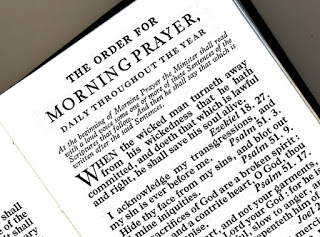Come and ransom captive Israel: the penitential sentences and Confession at Matins and Evensong in Advent
Three of the sentences particularly demonstrate this. The first sentence, Ezekiel 18:27, is part of the prophetic discourse which concludes, "Therefore will I judge you, O house of Israel". Similarly, Joel 2:13 follows the prophet's call, "Blow ye the trumpet in Zion". Daniel 9:9-10 is from Daniel's confession, acknowledging of Israel, "we have sinned, and have committed iniquity, and done wickedly, and rebelled, even by departing from thy precepts and from thy judgements".
These sentences, therefore, in a particular way place the Church alongside Israel: Israel's disobedience is the Church's disobedience; Israel's faithlessness is the Church's faithlessness; Israel's unrighteousness is the Church's unrighteousness. Israel defeated, exiled, shamed, is the Church in Advent praying Veni, veni Emmanuel, praying "thy kingdom come", praying "give us grace to cast away the works of darkness".
This, then, also shapes how we pray the Confession at Matins and Evensong, for here too we kneel alongside Israel. When we confess "We have erred and strayed like lost sheep", it is Isaiah's words to faithless Sion that we are, of course, praying: "All we like sheep have gone astray". Likewise, "We have offended against thy holy laws" is echoing Daniel's great confession on behalf of Israel, repeated in the penitential sentence: "neither have we obeyed the voice of the Lord our God, to walk in his laws which he set before us".
One of the most potent and stinging phrases in the Confession - "there is no health in us" - is also surely to be understood in the context of Isaiah's opening declaration against ancient Israel:
the whole head is sick, and the whole heart faint. From the sole of the foot even unto the head there is no soundness in it; but wounds, and bruises, and putrifying sores: they have not been closed, neither bound up, neither mollified with ointment.
This is us, the Church. The wounds of sin are deep, infected, always needing the grace that brings healing.
There is no health in us. And so we seek the Lord's advent.
The absence of seasonal material is often used as a criticism of the Cranmerian daily office. There are, however, deep seasonal resonances throughout Cranmerian Morning and Evening Prayer, calling us to reflect and meditate upon how these words, prayed each day, have rich layers of meanings which can be drawn out in light of the mystery of our redemption set forth in the liturgical year.
We have seen how the penitential sentences and Confession at Matins and Evensong have deep and profound resonances in Advent, bringing us alongside Israel over the long centuries of shame and exile, of waiting and yearning for the glory of Yahweh to be revealed, restoring Sion, "and all nations shall flow into it".
And in this week when our Jewish friends and neighbours celebrate Hanukkah, these penitential sentences from the scriptures of Israel, and the daily Confession rooted in the proclamation of the prophets of Israel, are a solemn reminder to Anglican Christians in Advent of our profound debt to the Jewish people, for we Christians are "a wild olive tree" grafted on to "a good olive tree". In a time when the evil of anti-Semitism is now once again casting its vile, dark shadow over our culture, to hear these penitential sentences, to pray this Confession at Morning and Evening Prayer, is to proclaim our need of and dependence upon the One "made of the seed of David according to the flesh".Now, in the days of Advent, we hear the challenge of the words of the prophets at the beginning of Matins and Evensong, calling us to repent before the coming glory of the Lord, as with Isaiah and Sion we look for the healing grace promised to those "that dwell in the land and the shadow of death".





Comments
Post a Comment